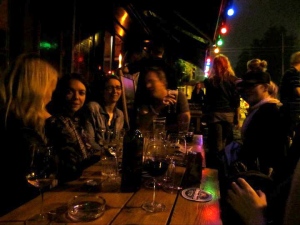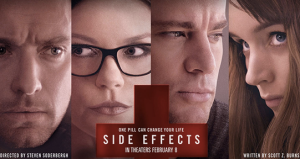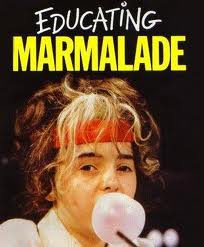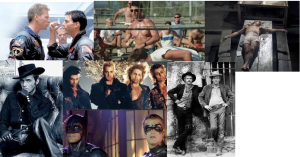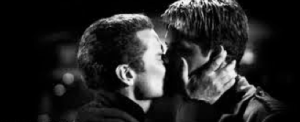Category: Politics
“It always seems impossible until it’s done.”
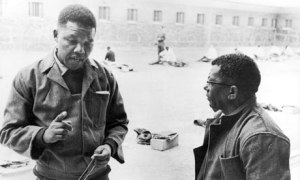 How to begin? Over the past day or so, across the globe, across all sections of all kinds of societies, the voice of individual after individual has paid testimony to the profound significance of Nelson Mandela’s life, and death. Crowds have gathered to sing and dance and celebrate, emulating in their actions the idea of solidarity and shared humanity that his life came to symbolise. I wonder if there is any more I can add to the general outpouring of goodwill of a scale and breadth that it is impossible to imagine any other political figure inspiring.
How to begin? Over the past day or so, across the globe, across all sections of all kinds of societies, the voice of individual after individual has paid testimony to the profound significance of Nelson Mandela’s life, and death. Crowds have gathered to sing and dance and celebrate, emulating in their actions the idea of solidarity and shared humanity that his life came to symbolise. I wonder if there is any more I can add to the general outpouring of goodwill of a scale and breadth that it is impossible to imagine any other political figure inspiring.
The death of Margaret Thatcher earlier this year prompted an immediate blogpost on my part. With no time to think it came out as an emotive stream of consciousness – it was easier to write. This time, life and work has forced a delayed response, and that delay seems to demand a thoughtful, considered approach that I don’t quite know how to achieve. Conjuring Thatcher, of course, is not just about her also having died this year, and it is not just about her also having been a towering political figure of our historical moment, and it’s not just about her having dismissed the ANC as a terrorist organisation and having opposed sanctions as a crime against free trade. And it’s not just that the absence of human empathy, which places those Thatcherite ideals of personal wealth accumulation and economic liberalism above all else, is in such stark contrast to the quite extraordinary ideals of truth, reconciliation and bipartisanship which led South Africa’s peaceful transition from apartheid to democracy. For people like me, figures like Mandela and Thatcher, and the events and moments connected with them, have somehow and somewhere along the way coalesced in our brains or our memories to forge and shape our characters, our attitudes, our belief systems, our moral compasses.
What I want to say is that for me Mandela symbolises the idea that there are some things which are so straightforwardly abhorrent that the only possible human response is to resist them. When it came to the South Africa which existed at the time I was becoming politically aware these things were not difficult to recognise – apartheid was so obviously a moral fucking outrage. It had its fair share of apologists and, of course, there were those who were happy to turn a blind eye to its atrocities in the name of making a quick buck – do we all recall Status Quo and Queen playing Sun City, Barclays Bank’s infamous investments, or indeed those of our late Prime Minister’s late husband Dennis Thatcher? But for many of us, it was clear that feigned ignorance was no possible response. We weren’t in South Africa, we weren’t facing the relentless daily degradation of apartheid. We were on the other side of the world, but their struggle felt like our struggle (I guess that’s what empathy means) and it seemed important to do something, however small. So we refused to buy South African produce. We stood vigil outside South Africa House. For years. We went on demos, we went to gigs, we sprayed slogans. Eventually history caught up with us, and when it did, and when from a cold 1990 February day in the UK we watched Mandela walk free from prison, we were moved beyond words. And proud to have been on the right side of history. And we understood the power of solidarity.
Mandela’s final steps towards freedom were accompanied by the unseen ghosts of those who hadn’t made it: Steve Biko and the countless others who had ‘died’ in custody, the children of Soweto who had been gunned down so mercilessly on the streets of their township, all those whose lives had been cut short by the regime. All those who had shown the kind of courage and dignity in their resistance that we all hope we would be capable of. We’ll never know, of course, unless we are tested. And who wants to be tested like that? We need our Mandelas to help us tell our stories and understand our histories, we need those human beings in our world who can rise beyond the ordinary to achieve the extraordinary, and Mandela was without doubt an exceptional human being. But we should not try to sanctify him, and we should remember that all of those people who gave their lives in the struggle against apartheid were potential Mandelas. When Mandela walked out of prison he carried their hopes and dreams with him.
When Thatcher said that there was no such thing as society she was wrong. There is nothing but society. None of us is self-sufficient, everything we do, or buy, or use, or think, or love is connected to someone else. It is how the human race has constructed itself. Perhaps today, in our increasingly complex and global society, it is not so easy to recognise those things that are straightforwardly abhorrent – perhaps challenging or changing or resisting them is not so straightforward. How will history judge, for example, our embracing of neo-liberal economics when every time we buy ‘competitively’ priced goods we are tacitly condoning child labour and sweatshop conditions somewhere else in the the world? These are complicated times. Let’s remember, though, that Nelson Mandela was not some kind of straightforward Christ-like figure. Yes, with his capacity for dignity and moral courage, decency and compassion, forgiveness and empathy, he has come to symbolise the best of humanity. But he was also a fighter, a thinker and a political strategist. Perhaps the best way to honour his life would be try like hell to harness all of these traits and direct them at the profound social injustices which taint our world today.
In the meantime let’s celebrate his life and take a little trip down memory lane.
Get Yer Hands Off My iPod (and my salary)
So, I’m heading home from work, wandering down the darkened North End Road, minding my own business, absentmindedly choosing a piece of music to listen to when, before I’ve even registered it’s happening, two motorbikes have steamed off the road onto the pavement and are hurtling towards me or, for fuck’s sake I think as it begins to dawn, at me. A punch is landed and the fist returns to make a grab for my ipod.
Of course, what these two-bit thieves on their second-rate motorbikes couldn’t possibly have known is that this particular piece of techno-chicery was a 40th birthday present and is loaded not just with music, but with memories of a weekend spent celebrating that landmark occasion. And there’s no way I’d give it up that easily. Needless to say the bike-raiders sped off empty handed.
I did my civic duty, of course, and called the cops, and spent half an hour sitting in the back of a police car on the side of the road recounting the incident with as much attention to detail as I could muster. But we all know that memory is a deceitful little thing, and twenty eye-witnesses’ll give you twenty different versions of an event so I really don’t expect those boys or girls in blue to get anywhere with this one.
When we finished with the serious stuff, one of the officers asked the final question on his checklist: ‘And have you been a victim of any other crime in the past twelve months?’
‘Well,’ I said. ‘There is that pay freeze.’
Oh how we laughed.
Which side are you on?
The former British Prime Minister, Margaret Thatcher, died this morning. I’ve just heard the news. Strangely, I feel like crying. I was 7 years old when she was elected. I have a terrible memory, but I remember that quite clearly. I was 19 when she was finally ousted from office, stabbed in the back by her own government. I remember that quite clearly too. It’s impossible to convey the poetic justice of that moment, I can only say that if you were around at the time you felt it. In your bones. We went out into the streets and partied. By the time we finally voted the Tories from office I was 25. At last a vote I had cast had counted. In the elation of that election night, nothing could have prepared me for the betrayal that would be the New Labour government. The country I grew up in was shaped by Margaret Thatcher; my life has been shaped by a profound abhorence of everything she stood for.
Prior to becoming PM, she was renowned for ending the provision of free milk for primary school children: “Thatcher, Thatcher, milk snatcher” we called her. Her contempt for the welfare state and her messianic embracing of the free market were never in question. She deregulated and sold off whatever she could. She took the unions on, one by one, and when she wasn’t able to use new legislation as an effective truncheon with which to clobber the organised working class, she used the police. And tore apart communities in the process. Unemployment soared and the unemployed were demonised. Section 28 was brought in on her watch – make no mistake, the effect of this was not simply to shove gay women, men and children into the darkest corners of the closet, it was a state sanctioning of homophobia. And then, of course, there was the poll tax.
I can’t say much more right now. I can’t think straight. I have news streaming on websites as I type, the radio blaring in the background, and facebook bleeping its updates as word of her demise makes its way across the social network. Maybe I’ll come back to this topic when I’ve had time to reflect and gather my thoughts. Maybe I’ll write something coherent, and detailed about those Thatcher years and the bleak legacy they’ve left us. But for now, all I can think about is our current government. Helmed by Tories and, so the rhetoric goes, held in check by the Lib-Dems, this Coalition, through its cynical and systematic attacks on our health service and welfare system, is doing what Thatcher could only have dreamt of. Perhaps that’s why I feel like crying. But then I remember the poll tax. And I remember a population stopping dead in its tracks and taking democracy to the streets, and saying loudly, unequivocally, No. In the end it was the poll tax that did for Thatcher. Or, to be more precise, our refusal to pay it. Our collective refusal to pay it. Our refusal to quietly refuse to pay. And then I think of the bedroom tax, which came into force a week ago, and wonder if it isn’t just about time to take to the streets again.
Stop your messing around
Pauline Black. It’s official. I’m in love. Saw The Selecter live for the first time last week. You might think it’s thirty+ years too late, but really, it’s not. This is one slick outfit. They brought the house down. Having spent a lot of time lately ranting about the absence of fictional female heroes on our movie screens, it was nice to see a real-life one strutting around on a stage. Pauline Black. The voice of 2-Tone. Cuts a dash in a fedora. And takes no crap: she changed her surname from Vickers to Black so that people would have to call her black.
And as I looked on, and listened, and danced and sang, and laughed along with the crowd, I couldn’t help but take a little trip down memory lane to where ska and reggae smashed up against punk and a healthy dose of working class irreverence and created a peculiarly British sound. And an oh so stylish look. (Perhaps a little of the very British mod found its way in too.) I really don’t go in for patriotism, I’m not full of rose tinted affection for a Blighty that never existed, but if there’s anything that could at least make me feel glad to have been born British, glad even to have been born in the 70s, it could just be this sound. And if there’s something that can make me believe that, in the end, the harder they come, the harder they’ll fall it might just be this sound.
Come reminisce with me:
Have a laugh at this hilarious video (I’ve only just noticed that this is all filmed around my manor. It’s not Coventry…) Be amazed, or horrified, or enraged at how relevant this track sounds today:
OK, so there’s a theme brewing. Insert name of your choice:
I’ll leave you with Too Much Pressure. You know what happens when there’s too much pressure, don’t you? Eventually something explodes…
All videos linked from YouTube. None are my work. Thanks to all who posted them there.
Annie Get Your Gun
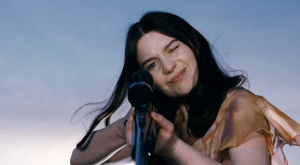 I know I probably shouldn’t trouble my little head with this stuff, but a little thought has been bubbling away in my little brain and has reached boiling point. So I thought I’d lift the lid and share it with you all. Before I explode.
I know I probably shouldn’t trouble my little head with this stuff, but a little thought has been bubbling away in my little brain and has reached boiling point. So I thought I’d lift the lid and share it with you all. Before I explode.
This thought I’d like to share has to do with films I’ve seen so far this year. Now, I’ve seen a lot, so I’m going to confine myself to those I’ve seen at the cinema, on the big screen, and paid good money for. And I’ll narrow the field further to talk only about mainstream, narrative, big new releases. Because, when I think about these films, I see a pattern emerging. Perhaps you’ll see it too?
First up was Life of Pi, all earnest and shiny and 3D and jumpy out of the screen. And I guess it was all right. If you like that sort of thing. I don’t much. And as it was adapted from a book there were externally imposed limitations, so there’s really no need to be irritated by the pretty, dancy girlfriend, or the mother/zebra whatever, or the wife whose role is to wander on set, once, weighed down by children, and do nothing. So I wasn’t.
But then I went to see Lincoln. Regular readers of this blog may already have formed a strong opinion of my strong opinion about this film. New readers, if you’re still with me by the end of this post, might want to check out Am I missing the point of facebook? or Why Lincoln is crap. Maybe Spielberg was able to resurrect Freud and get him to do a bit of moonlighting as the script advisor. Mrs Lincoln emerges as a textbook hysteric. Thank God Abe is around to help her steer an even course. And then there’s the stoic freed slave who pops up from time to time observing the men do their politics, or accompanying the mad Mrs Lincoln somewhere, or whispering with Mr Lincoln, a symbol of just how very wise and decent he is. And reminding us, through her remarkable absence of presence, just how non-threatening good ole black folk can be. Especially black women. And then, as if to drive the point home, there’s the housekeeper. The one who mops the furrowed brow of Tommy Lee Jones and so much else besides. Who doesn’t get to be at all angry about the state of her world.
And then, the following week, I found myself up close and personal with Django Unchained. Which I loved. Except, it’s a bit long and goes a bit off course in the final stretch. But still, I thought it was great. Except, well, there’s Broomhilda. Who’s lovely ‘n’ all, and it’s great that Django wants to rescue her. But the thing is, she’s a runaway slave. A repeat offender runaway slave. And the film makes the barbarous treatment a recaptured runaway slave is likely to receive explicitly and uncomfortably clear. So I think we have to assume that Broomhilda has balls, colloquially speaking. Which makes her quivering lipped, fainting behaviour a little out of character. But, perhaps, defensible. What is not defensible, no really, Quentin, it’s not, is her sitting astride a bloody great horse in the final moments of the film, holding a bloody great double barreled shotgun, which we can assume is bloody well loaded, whilst waiting helplessly for Django to do his thing.
Next was Arbitrage. I don’t know what to say really. Other than that I’m very glad my local cinema has a bar, so that I had alcohol to help me get through the tedium. And so we have the wife. Who doesn’t work, of course. But that’s ok because she does lots of charity stuff. And she gets to take a bit of control at the end of the film. And the mistress. Who’s a painter. But not very good. But that’s ok because he bankrolls her. Thankfully she gets killed off in a car crash fairly early on. She doesn’t actually get to drive the car, of course. And the daughter. Who works for him. And works out that he’s a fraudulent swindler. Because she’s got a brain. But she doesn’t get to do anything about it. And then there’s the dead driver’s son’s wife. Who gets to be supportive.
And so to Side Effects. Again, regular readers will be aware of my response to this film. A previous post, Side Effects? Of what? Lesbian sex? pretty much sums it up. But, to give the film its due, at least all the women in it actually do stuff. And at least they can actually claim to be principal characters. And its much more fun watching evil lesbians going about their evil business than virtuous non-entities, well non-entitying. If you know what I mean.
And finally there was Stoker. It’s not a great film, but if you like a bit of gothic (which I do), and you find watching Nicole Kidman’s face not move strangely fascinating (which I do), and you have have a thing for intense, odd-ball actresses (which I do) then it might be up your street. But really, I liked it for its blackly comic ending. It’s a strange old world, though, when you find yourself jumping for joy in a darkened cinema as the eighteen year old protagonist (and there’s the key word) offs a cop. Jumping for joy just because she actually GETS TO DO SOMETHING.
Imagine… if we really were all in this together
I’m not about to go all John Lennon on you. Fan that I am, now isn’t the time to channel some self-indulgent, long-haired hippy in a white bed. But, to coin a phrase, Imagine… Imagine living in a country at near economic collapse. Imagine a chronic housing shortage. Sounds familiar, right? Now imagine, and please stick with me here readers, I know this is a leap of faith, but imagine a response which says something like: let’s build houses. No, not houses, homes. That way people will have somewhere to live. Somewhere to live well. Somewhere reasonable. Somewhere decent. Somewhere they can afford. And people can be employed to design and build these houses. Then more people will have jobs. And that will be good for the economy. And you know what, while we’re at it, let’s imagine a universal healthcare service, from the cradle to the grave. Free at the point of delivery. Because we’re all in this together. And because we’re all in this together, and we’re essentially social creatures, let’s imagine that we build libraries and cinemas and swimming pools… Just imagine.
And so Ken Loach gives us The Spirit of ’45. And it tells the story of a time when people imagined all this and more, and made it happen. Not perfectly, but with vision. Because we were all in this together. Go and see the film. It’s moving. And inspiring. And enraging. It ain’t subtle, but with the Bullingdon Club and their acolytes, aided and abetted by political technocrats of every hue, selling off the family silver, ours not theirs, now isn’t the time for subtlety.
Now is the time to say GET YOUR HANDS OFF OUR NATIONAL HEALTH SERVICE. And give back those bits you’ve flogged off already. And while you’re at it, we’d like our railways back. And our energy, so some smart people can actually plan an energy policy that might have the slightest chance of success. And our postal service. And every other essential service that you and your predecessors have given away without so much as a by your leave. But you know what, we’re reasonable people here, we wouldn’t want you to leave empty handed. Tell you what, why don’t you take THAT INSANE BANKING SYSTEM and those HIGHER RATE TAX EVADERS, that you’re so bloody fond of, with you when you go?
Real Vampires Don’t Sparkle… but maybe that’s the point
Ok, I can’t quite believe that I’m going to attempt this. Perhaps I should start with a disclaimer. I love Gothic fiction. I’m a big fan of the horror genre in film. I particularly love vampire flicks, and I like my vampires to have fangs. I’m interested in film. Interesting film. I’m interested in literature. Interesting literature. I consider myself a feminist. I say all this, and I could say so much more, as a kind of begging for forgiveness in advance. Because, what I’m about to do, and I can’t quite believe it myself, is offer a kind of apology for The Twilight Saga. No. More than that, offer a reason for its popularity. And more than that, suggest that, despite its deeply suspect ideology, it’s not so bad really. Bear with me, readers.
I ought to make it clear, I haven’t read a single word of a single one of the Twilight books. I don’t intend to. I probably wouldn’t like them. Which is fine. I’m fairly certain I’m not the target audience anyway. I have, however, over the past couple of weeks, watched all five of the films. I thought it was about time to have a look at just what it is, precisely, that has been preoccupying the kidz over the past few years. Or at least, that’s what I tell myself. My initial reaction was one of horror. The wrong kind of horror. I watched the films in the wrong order, starting with Breaking Dawn: part 1, which with its unflinching pro-life subtext (actually not so much of the ‘sub’) left me fearing for the ideological hearts, not to mention the psychological, and indeed physical, well-being of our teenagers. And then there’s the stalking, controlling, coercive boyfriend. And the mind games. And the ‘no sex before marriage’ clause. And the heroine seemingly free from any agency at all. And Wolfy (sorry, Jacob) imprinting on a new born babe – I’ve tried like mad to rationalise this one, but really, whichever way you look at it, it’s just creepy. And. And. And…
And what about adding to the body of Vampire mythology? Harmless ‘vegetarians’? Repeating high school ad infinitum? Driving around in Volvos and Mercedes? Living in (unaccountably affluent) peace in a Scandinavian style lodge? It’s not that this is all a bit off canon, so much as this is all a bit lame. And then there’s the sparkling. Sparkling, I tell you. Vampires don’t sparkle. They chow down on your neck with bloody great fangs. They exist as a metaphor for sex, repression, fear, desire. They offer a safe space for transgression. They explore the other. They explore the id. They DON’T BLOODY WELL SPARKLE.
But then maybe that’s the point. Maybe Edward, in all his toothless, sparkling glory is so non-threatening that the sinister undercurrents of his behaviour are rendered utterly meaningless. Maybe the adolescent and the pre-pubescent fans buy into the unreconstructed gender fantasy because it so clearly is fantasy, and requires so little exertion on their part. Maybe, surrounded as they are by a hyper-sexual, disposable culture, the innate conservatism of The Twilight Saga offers some breathing space. Maybe they just fancy Robert Pattinson. Or Kristen Stewart. Maybe they’re frightened of growing up, and they find something reassuring in Bella and Edward achieving a state of stasis while still teenagers. Or maybe they like waiting ’til the final film for Bella to actually get some muscles – a kind of delayed gratification.
Or maybe I should give up the ghost and direct you to this biting Buffy/Twilight mashup instead…
Thanks for the reminder that Real Slayers Stake Vampires. Especially if they sparkle.
Google ‘real vampires don’t sparkle’ and click on images. Go on, it’s fun.
Many thanks to Shannon for the lightbulb moment. Cheers.
Side Effects? Of what? Lesbian sex?
Spolier alert. Evil lesbians’ evil plan foiled by super sleuth Law. Hetero-hegemony restored and all is well with the world. Phew!
Am I alone in being somewhat thrown by Soderberg’s latest? To be honest I thought I was about to see a pharma-thriller of some sort, perhaps an exploration of drug company corruption, or fraught examination of a descent into moral ambiguity, you know, that sort of thing. And to be honest, that’s kind of how the film started out. And then it seemed as if, at some point, someone did a nifty script exchange. And didn’t tell anyone. And no-one noticed.
Don’t get me wrong, I’m a big Soderberg fan. He knows how to entertain. And this schlocky thriller looks great, sounds great and is a tremendous amount of fun. A barrel of laughs you might say. So much so, that we were rolling round in the isles, pretty much paralytic with mirth, by the time the final credits rolled. Casting Channing Tatum was a master-stroke, although I have to confess I didn’t know who he was until this evening, and I’m not convinced I’ll be able to remember who he is tomorrow morning. And isn’t that a girl’s name anyway? Never before have I witnessed someone on screen so totally forgettable that Jude Law emerges from the void a charismatic scene-stealing dynamo. Catherine Zeta Jones and Rooney Mara are immensely watchable, and look great too, which evil lesbians really ought to if they possibly can. Amazingly though, given the fine acting capabilities of these two, as well as their unfair share of God-given good looks, their pseudo-sex scene that allows for the denouement of film is spectacularly unconvincing. What a shame.
I really can’t object to Catherine Zeta Jones being cast as a femme-fatale. She does the job admirably. And why not write her character as a lesbian? And why not have her character have a relationship with Rooney Mara’s character? And why not write these characters as cunning, amoral schemers who ultimately get their comeuppance? Except, well, wouldn’t it be nice if, you know, just occasionally, the hero happened to be a lesbian character. And could, just maybe, have sex with another lesbian character, not as part of an evil plan, but just coz they happen to, you know, feel like it. And maybe the sex could go unpunished. You know, just occasionally. Occasionally…
Come on Soderberg, don’t bow out of Hollywood just yet. Clearly you have more work to do.
Bad Girl Warning
I was having a drink with a couple of pals the other night. Our train of thought meandered from the policies of the Israeli state to the resignation of Pope Benedict to baptising babies to Methodism to Oranges Are Not the Only Fruit to, yelled out in unified bingo-style abandon, MARMALADE ATKINS! Talk about 6 degrees of separation. Now to those of you who aren’t from the UK, this last one might be a bit niche. In fact to those of you who are from the UK, but aren’t of an age to have been watching kids TV in the early 80s, or whose parents thought ITV was a bad influence – you know who you are – this will also seem a bit niche. Nonetheless, I was struck by the profoundly powerful memory we all shared of this anarchic character from the dark and distant days of three TV channels. (OK you purists, I know she started out in book form but for a whole generation Marmalade Atkins was that girl from TV). And she was our hero.
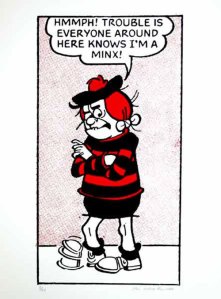
That got me thinking about other anarchic characters from my youth. Minnie the Minx. I loved her. She was my alter ego. What am I saying, there was no alter, she was my ego. She has a statue in Dundee, you know. I was an avid ‘70s Beano reader, a member of the Dennis the Menace and Gnasher fan club, had one of those badges with the wobbly eyes, but Minnie was where it was at.
In the late ’80’s Darlene, the younger daughter in Roseanne took up the banner for irreverent youth, saving those of us with no interest in Disney Princesses from a fate worse than death. And for those aspiring to more adult themes (alcoholism, sexual violence, bereavement, relationship trouble), hard-talking, gun-toting, gin-swilling Chris Cagney saw us right through the decade.
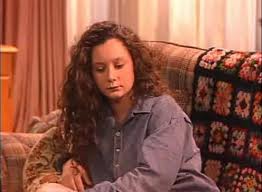
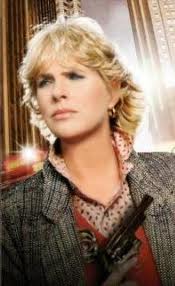
By the time I left home in the very last year of the 1980’s, TV as we had known it – a scheduled event, galvanising a family, a nation, a subculture – had only a few years left to live. There were now four channels, satellites were springing up like extra-terrestrial beings clinging to the sides of grey houses (everything was grey in the 80s). Video recorders were in vogue. Soon there would be a fifth channel. And then cable. And then internet TV.
So let’s raise a toast to simpler times and remember when a few tough talking female characters scattered first through our comics, and then across our cathode ray tube TVs, offered a bit of feisty escapism for those of us who’d never much wanted to be one of Charlie’s Angels.
Unchained Melody
So, Twitter has been hacked and passwords stolen ‘n’ it’s all just so awful. On the plus side, if the hackers have got my details, I’d really appreciate a reminder coz I can’t keep any of my trillion or so passwords in my head. Can anyone?
After my ‘Lincoln’ induced rant last week (oh, and don’t get me started on ‘Life of Pi’ popping out of the screen at me like Disney on acid) my faith in cinema has been somewhat restored, though not entirely without reservation, by ‘Django Unchained‘. Thanks Jamie Foxx: dodgy moniker aside, you make a mean cowboy. I won’t go any further here as controversy enough surrounds this flick, and you can pick up reviews and follow microblog spats to your heart’s content all across cyberspace. Perhaps there’s a point to blogging.
However, this restoration of faith has been just a little shaken by the news that Steven Soderberg’s taking his leave of Hollywood. I understand that I’m a bit behind the times on this one, rumours have been circulating for a while, but I only caught up on the news a few days ago. I must admit to having a soft spot for Soderberg – who doesn’t love Clooney and J-Lo in the boot of that car? Does anyone know what make of car that was, anyway?
Perhaps he’s right, though – perhaps the really interesting work has migrated to television. Still, it seems a shame that while the House of Commons dragged itself into the 21st century and voted to legalise gay marriage last night, leaving the embittered entrails of Roger Gale splattered on the chamber floor (an added bonus), across the pond Soderberg says that Hollywood studios are still refusing to fund projects deemed too gay. So, I thought I’d put together an itsy, pretty montage of leading-man moments that inexplicably slipped beneath the studio bosses gaydar:
And let’s not leave TV out of the picture. No subtext here – this one’s for you Roger:

